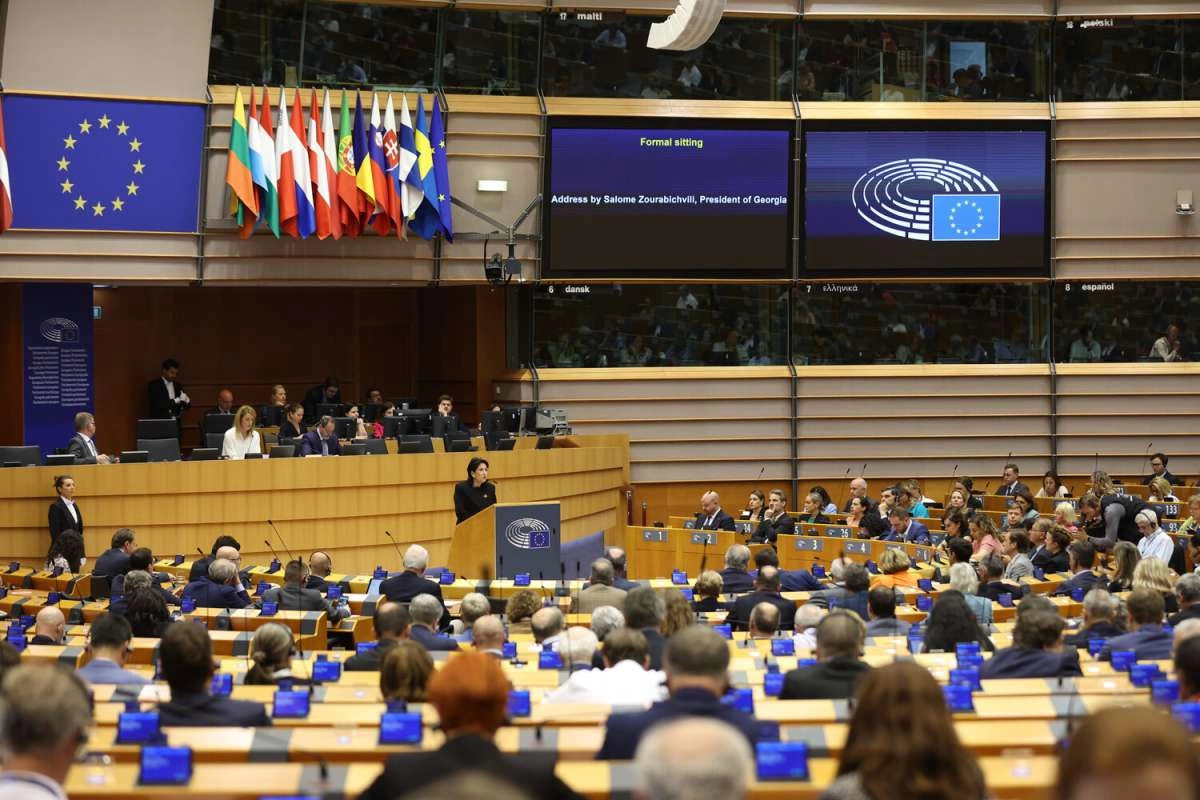
The figurehead president warned that denying EU membership candidate status would embolden Russia and empower the already-ascendant forces of illiberalism in Georgia.
Image: president.ge
(Eurasianet) When the Georgian president addressed the EU parliament on May 31, she was interrupted by applause several times.
And at the end of her 35-minute speech, the first such address by a Georgian head of state in 13 years, MEPs gave her a standing ovation.
But it's yet to be seen whether Salome Zourabichvili managed to persuade MEPs of Georgia's worthiness for EU membership candidate status.
The country's road toward that status over the past year has been winding and bumpy. The French-born figurehead president, earlier often criticized for saying the wrong things, has emerged as an unlikely standard-bearer for pro-EU Georgians. She has also grown estranged from the government that once supported her and that now has taken a sharp populist and anti-Western turn.
"Not only is our European choice legitimate, there is no alternative to it because it is based on our values, our history, our struggles, our determination, and our vision for the future," the president said in one of several passages of her speech that she delivered in French.
Zourabichvili's address follows yet another series of controversies that took the relations between Tbilisi and Brussels to yet another new low.
Earlier in May, the ruling Georgian Dream party quit the Party of European Socialists, an influential EU grouping as it faced expulsion risks after Georgian Prime Minister Irakli Garibashvili participated in a prominent right-wing forum. And just two days prior to the president's address, European diplomats in Tbilisi passed to the Georgian Economy Ministry a démarche of EU member countries objecting to the recent resumption of direct flights with Russia.
And right on the eve of Zourabichvili's Strasbourg speech, Georgian Prime Minister Irakli Garibashvili told the Bratislava GLOBSEC Forum that NATO enlargement and Ukraine's desire to join the alliance were among the reasons for Russia's invasion.
The remark was roundly criticized as a repetition of the Kremlin's narrative that NATO and Ukraine itself are responsible for the brutal war.
Against this backdrop, the president tried to at least get the rhetoric right: during the EP address, she reiterated her firm solidarity with Ukraine, spoke extensively about the historic cultural and political links between Georgia and Europe, and recalled Georgia's decades-long work toward European integration.
She then sought to convince the room why her country should be granted candidate status later this year, even if Georgia is "not perfect, far from it."
"Leaving us behind would only encourage Russia to seek compensation for its own failure to win a war it started but cannot end," Zourabichvili argued. She warned that a refusal would leave Georgia in a "gray zone," providing Moscow "with a temptation to look for weaker spots anywhere else."
Another price Georgia will have to pay if it is again denied the status will be a democratic one, Zourabichvili argued, drawing sinister scenarios of anti-Western, illiberal forces in the country taking advantage of the frustration. According to the president, a positive decision on membership candidacy would also cement Georgia's role as a pro-European force in the region, and acknowledge the "democratic credentials" of the Georgian people and civil society.
Georgia already suffered a defeat on its candidacy bid last year, when the Russian invasion of Ukraine made Brussels more welcoming of new membership applications. While Moldova and Ukraine became EU membership candidates, Georgia was left behind and told to come back after fulfilling 12 reform conditions.
Many blamed the failure on Tbilisi's controversial moves closely preceding the decision, such jailing pro-opposition journalist Nika Gvaramia on questionable grounds and engaging in confrontational rhetoric and conspiracy theories against the West.
Support for EU integration is consistently high in Georgia, but some of the government's actions, like the recent attempt to pass foreign agents legislation, have led many to think the ruling party might be deliberately sabotaging the country's candidacy prospects.
The government and ruling party officials insist they do want it and complain that it was unfairly denied last year given Georgia's positive EU reform record.
Yet despite some reforms, Brussels has criticized many of Tbilisi's recent moves and noted the rapidly dropping rate of Georgia's alignment with the EU foreign policy decisions and declarations (from an "already low" 44 percent last year to 31 percent this year).
Georgian officials have tried to fend off criticism by citing the need for pragmatism amid Russian pressure.
"All Georgia did was to continue its responsible policy of strategic patience towards Russia, scrupulously practiced for many years now," Georgian Parliament Speaker Shalva Papuashvili said in a May 30 tweet defending Garibashvili.
But critics wonder what Georgian Dream's democratic backsliding and constant attacks against the West - that could lead to another failure to get EU membership candidate status - have to do with "strategic patience."
The final decision on the status is expected later this year, while an oral update on the progress may come as early as this month.
Zourabichvili's latest attempt to control the damage has been more or less positively received both by the ruling party and the opposition. But many want her to match her words with action as well, like pardoning Nika Gvaramia, the opposition journalist.
The president has so far left the prospect uncertain, saying she refuses to be "pressured" by either the Georgian government or those at home and abroad calling for Gvaramia's release.
"I will do what I think is necessary to do," she said in her EP speech.
Nini Gabritchidze is a Tbilisi-based journalist.
Share on social media